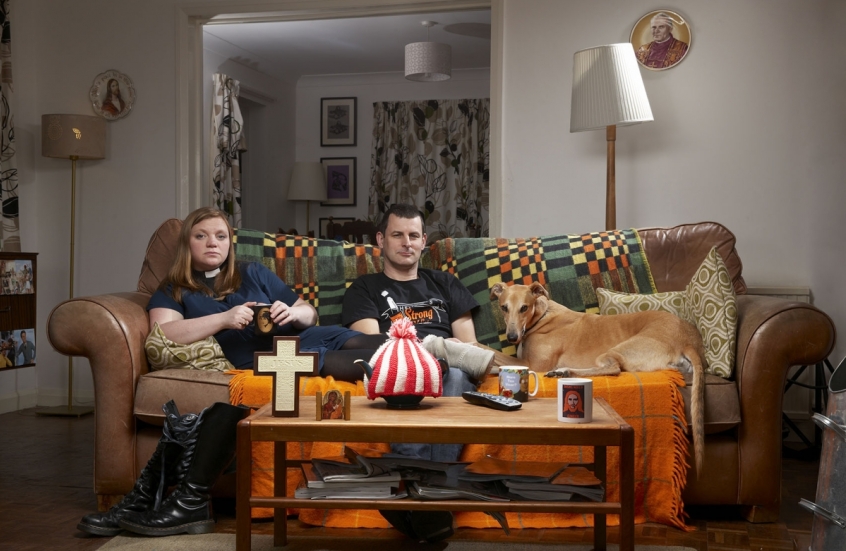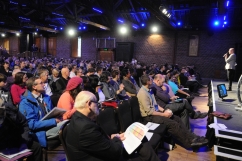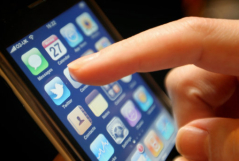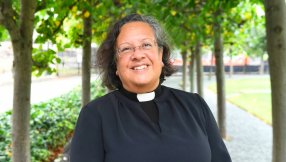
She's dressed as a giant orange to illustrate Christingle, and danced in last year's wedding flashmob video that attracted more than 760,000 hits on YouTube.
But now Rev Kate Bottley and her husband Graham have joined the armchair critics of Gogglebox, the Bafta-nominated Channel 4 show, which follows a regular cast of everyday people as they watch – and comment on – the week's television.
Kate is the vicar of the churches of Blyth, Scrooby and Ranskill in North Nottinghamshire where she lives with her husband, two children and Buster the dog (who is so popular on Gogglebox that he even has his own Twitter account).
She tells Christian Today how she's hoping to help change the way the Church is perceived.
Why did you agree to do Gogglebox?
When they phoned up to ask whether we'd be interested, it just sounded like so much fun – that's our first reason. We're massive fans of the show – this is the third series and we've watched it since the beginning.
Secondly I thought it would be a good thing to show Christians just being normal – and I use that word very loosely – but I do think that most of the portrayals that we have of clergy especially, and Christians on TV, are fictional. To see a real one doing real things and not being interviewed on Newsnight or not in a soap opera, but just a real one being normal on the sofa, I thought it might help, that it might be a good witness.
I didn't say yes straightaway because I'm not just sat there as me, I'm sat there as a vicar and a massive responsibility comes with that.
When you put yourself up for something like this is it is a risk – it wouldn't be right for everybody. We made a list of all the pros and cons and talked it through with spiritual directors and archdeacons and diocesan media advisors and decided to go for it.
What reaction have you had?
There's not been a lot of negativity. I think most people in my congregation are positive about it but really the people who might complain about it aren't watching Channel 4 at 9 o'clock on a Friday night.
It's not really aimed at that demographic. The demographic that watches it is 16 – 35 year-olds – the very demographic that's missing from most of our churches – especially the Anglican churches.
I've had a very small amount of criticism – one letter into the Bishop, a few grumbly tweets. What people seem to be upset about is that I have a political opinion. There's some sort of idea that if you're a vicar you shouldn't be involved in politics, that you should remain neutral.
Was Jesus neutral? I find that very difficult to understand, I think "are you reading a different gospel to me?"
But generally the response has been overwhelmingly positive. I had a girl tweet me the other day – "I've seen you on the show," she said. "You're the only vicar I know, how do I get my baby baptised?" I'm the only vicar she knows! To me the show was worth doing just for that...
People do say to me "If my vicar was like you I'd go to church."
And my response is, "Your vicar might be like me, most vicars I know are lovely; go and meet your own vicar."
For me this is not about celebrity...we really think God asked us to do it, so we did it.
I'd risk everything for the gospel. I'll risk looking stupid I'll risk looking like an idiot. I'll risk grumblies grumbling at me because one day I'll have to stand there and answer to the one that really matters.
How do you think the Church is perceived generally?
I think out there in the big wide world when it comes to the Church people feel hypocritical and disempowered.
They come to us as the church or as the vicar wanting their baby's christening or their wedding and whatever they want and they offer their tiny little scrap of spirituality, whatever that might be ie "I went to the brownies", or "I went to a church school". They offer that scrap and it's the richest thing they've got in terms of 'qualification' for church.
We need to take that and say "It's wonderful but actually you don't need that at all, we are the national church, we are there for everyone in this land, man, woman or child regardless of what you believe, we are your parish church."
The serious message is that we [Christians] are supposed to be joyful people but the image for some is just so different. It's just the look on people's faces when you say "yes you can have confetti", something as small as that. And people are so grateful. That's lovely and also it's a bit embarrassing because I think: "What experience have you had that told you that at your wedding the vicar's not going to let you throw little pieces of paper that dissolve in the rain? What were you expecting?"
At the same time I think it's lovely that I get to be that voice – and there are loads of us who are that voice – it should be that England expects its Church to be there for it, and that when it knocks on the door it finds it open.
How did you come to faith?
I was originally invited by a friend to go to church when I was 14 – and fancying Graham, who was the vicar's son, didn't hurt.
I did have a massive conversion experience. I was at a Christian Union meeting one lunchtime at school and a visiting speaker was talking about baptism in the Holy Spirit. I didn't know what they were talking about and she said to me, "you need to ask yourself if you're a Christian – if you're a follower of Jesus Christ."
And I said "I don't know" and she said "do you want to be?" and we prayed.
And then straight away I was running down the corridor, screaming and jumping and clapping and writing "Jesus loves you" on the board in the classroom and getting told off.
I thought people became Christians all the time so I didn't think it was a big deal. But people at church were really excited that I'd become a Christian. I understand it now.















